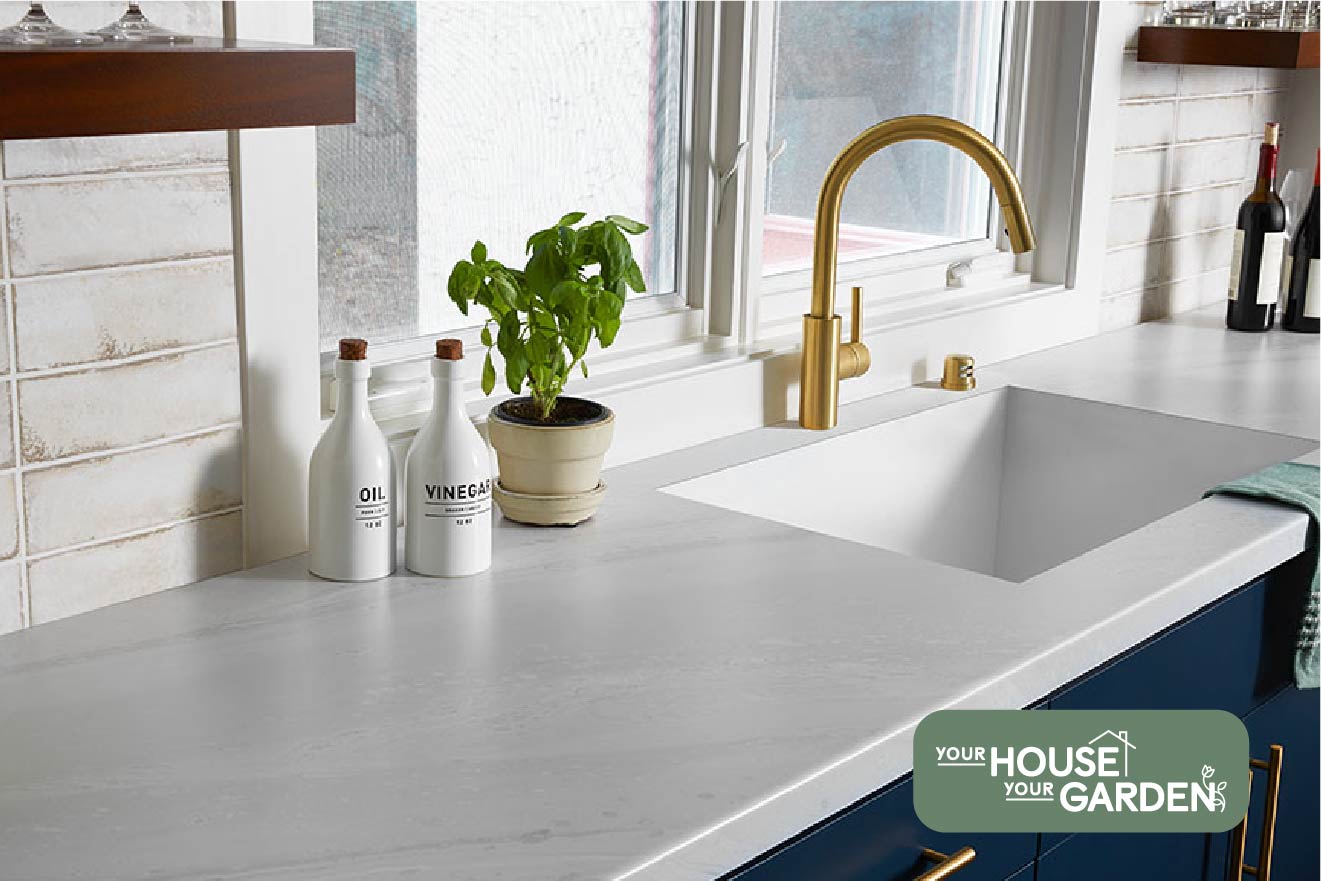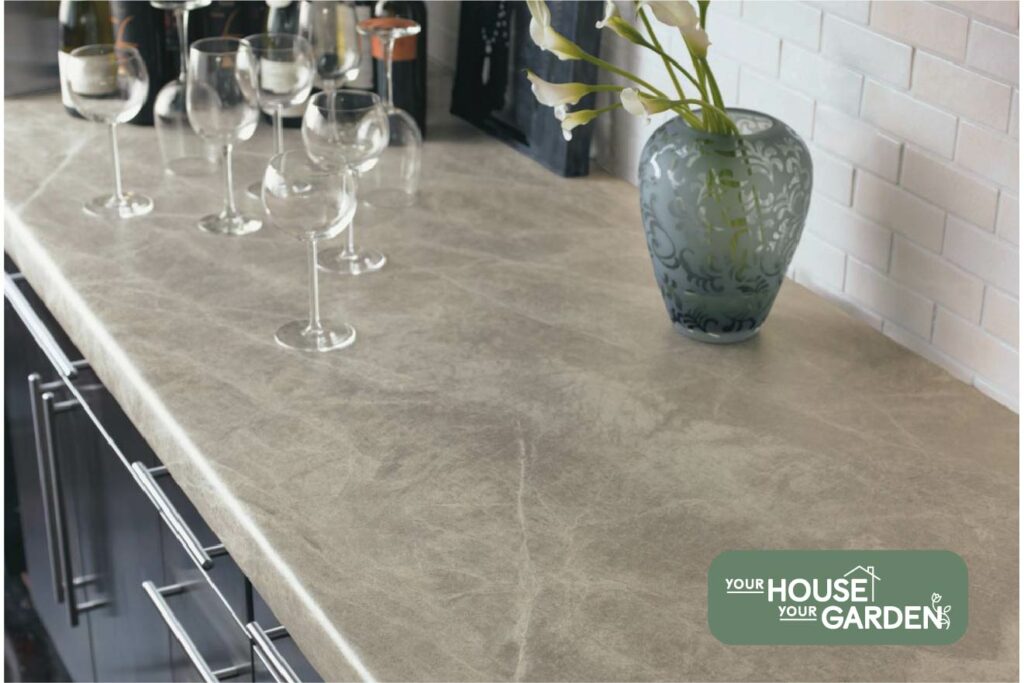Marble vs Laminate Countertop
Home » Home Remodeling » Kitchen Countertops » Marble vs Laminate Countertop
Granite, quartz, laminate, wood, Corian, and marble are all good choices for a counter which is why it may be difficult to settle on one material. If you’re deciding between laminate and marble, this is the guide for you. While laminate can be used to mimic marble, the materials are very different in terms of composition, price, and durability. Here’s everything you need to know about the two materials before settling on one option.
Marble vs Laminate: The Difference
As two different materials, here are the basics of marble and laminate:
What is Marble?
Similar to other natural stones, marble is quarried in certain areas of the world. This popular backsplash, flooring, and countertop surface material is limestone that has undergone extreme heat and pressure so that the calcium recrystallizes and becomes a harder stone countertop. The natural stone is quarried, cut into slabs, and then installed during bathroom or kitchen remodeling or renovation. Marble countertops are more expensive compared to other countertop materials but create an atmosphere of elegance and last more than just a few years.
What is Laminate?
Known to be the least expensive option when it comes to countertop materials, laminate counters are layers of laminated plastic resins onto particleboard or kraft paper. The most artistic laminates have a print layer of solid colors, texture prints, or patterns. The original manufacturer of laminate countertops is Formica which was introduced in standard wood grains and as an alternative to stone countertops. Formica countertops made plastic laminates popular in the 50s and 60s because it was one of the cheapest countertop options that could come in a dark gray color or stone patterns. Formica is still the leading company after laminates grew out of favor for a long period of time. Today, other brands like Panolam industries along with Formica offer high-pressure laminates which are more heat-resistant, scratch-resistant, and last longer.

Pros and Cons
To get to know marble and laminate better, the pros and cons of each material are outlined below:
Marble Countertops: Pros
No Two Slabs Are the Same: Marble countertops are made out of natural stone and are incredibly unique. Each marble slab has its own color due to its mineral makeup and veining pattern.
Will Take on the Heat: When hot items like hot pots, pans, or appliances are placed on a marble countertop, they will not melt or crack due to heat stress. Marble is a more heat-resistant material than engineered stone, solid surface material, and laminate countertops.
Improves Resale Value: Investing in a marble countertop and installing it during a bathroom or kitchen remodel can increase the value of a space. A stone like marble guarantees a high return on investment (ROI) because of its beautiful surface.
A Durable Countertop: Similar to granite countertops, another natural stone, marble countertops are durable. After installation, marble countertops can last up to 100 years with proper maintenance.
Marble Countertops: Cons
Has More Visible Seams: As one of the most unique countertop materials, marble slabs have to be mixed and matched. Homeowners may find it difficult to hide seams and choose a single grout color.
Not the Best Material for Those on a Tight Budget: This natural stone counter comes with a price that is more expensive compared to a laminate countertop or granite countertops. If other elements of bathroom and kitchen remodeling are more important than the counters of a space, marble is not the best material to choose.
Requires Professional Installation: Marble counters are made out of an expensive and heavy material. To protect marble countertops from being damaged during installation, professionals should take care of this process.
Will Need to Be Sealed for Maintenance: Unlike other counters, marble surfaces need to be sealed regularly in order to be stain-resistant and not be easily damaged by scratches. Stains due to acidic food and drink can cause etching to show on the surface of marble and scratches can harbor harmful bacteria.
Laminate Countertops: Pros
Perfect for Those Who Want to Save Money: Laminate countertops are very budget-friendly and are a great alternative to granite, wood, quartz, and marble counters.
Easy to Install: While a laminate countertop can be installed with professional help, Formica countertops can be installed by homeowners with the right tools and guidance.
Can Be Used for Unique Countertops: Laminated countertops are great for traditional countertops that are rectangular but are great for other laminate countertops as well. Laminate counters can be manufactured into a round or one-of-a-kind shape and even be made to seamlessly connect to your kitchen cabinets or other elements in your bathroom and kitchen.
Versatile for Bathroom and Kitchen Countertops: Laminate comes in a wide array of colors, patterns, prints, and finishes. Laminate can be used to mimic the look of wood countertops or match your granite flooring. Formica has made it easier to match a laminate surface with Corian or quartz backsplash and custom kitchen cabinets.
Easy to Take Care Of: A laminated countertop does not stain as easily as other materials because of its top layer. To maintain a laminate countertop, you can clean up spilled liquids with soap and water before they become permanent stains. Food debris can simply be wiped off.
Laminate Countertops: Cons
- May Have Noticeable Seams: For big laminate countertops, more than 12 feet long, seams are more noticeable. While these gaps can be hidden with a dark and heavily patterned laminate and a darker grout but more often than not, the seams are visible on big countertops.
- Can Delaminate Over Time: With constant contact with liquids like water, a laminate counter will delaminate. The layers will not stick together as well.
- Prone to Heat Damage: Due to the resins in its composition, laminate is not known to be the best material for busy kitchens.
- Not As Valuable as Other Materials: Compared to other options, (e.g., granite countertops, wood countertops, marble countertops, quartz countertops, and solid surface countertops), laminate does not have a high resale value.
Comparing the Two
A side by side comparison can help you decide on the best countertop material for your interior design needs, budget, and maintenance preferences:
Price
Laminate will cost as little as $20 per square foot and can go up to $65. On the other hand, marble retails at $60 to $200 per square foot. Laminate vs marble, a laminate counter is more affordable.
Durability
Comparing the two countertop options, laminate does not stain easily. However, this material will melt under immense heat and will last up to 10 years to 20 years which means that custom kitchen cabinets will outlive your countertops. On the other hand, marble will stain but can be sealed like granite for protection. While marble is not naturally stain-resistant it is resistant to heat and will last longer than a quartz or wood counter. Unlike other materials, marble can last up to 100 years with proper care.
Appearance
Marble is timeless and elegant with its intricate swirls and unique colors. This can create a focal point in any room and is one of the reasons to install marble. Formica has definitely manufactured more options over the years with laminates that look like granite or quartz as well as materials. Laminate counters are more versatile when it comes to appearance and can be manufactured in any color that best suits the interior of a kitchen or bathroom.
Maintenance
Laminate vs marble, the latter is easier to take care of. Simply clean up spilled food and beverages, do not use the counter as a cutting board, and avoid placing hot appliances and kitchenware directly on the surface. Marble requires more care with sealing every 6 months to 12 months and making sure that acidic substances do not make contact with the counter.
Hardness
Laminate is not known as a hard material and is prone to scratching and other forms of damage. Marble is also considered a soft stone and will scratch more easily than granite. Both materials should be protected against sharp objects in the bathroom and kitchen to maintain their surfaces.
Resale Value
Even the most expensive high-pressure laminates are not expensive as the most common marble slabs on the market. Marble vs laminate countertops, marble is the more expensive material. This means that it also has a much higher retail value than laminate does. Marble also lasts longer which is why it will increase the value of a home over time.
Installation
Marble should only be installed by professionals especially if you have custom cabinets, special appliances, or a unique layout. Installing marble counters requires expertise because of the weight of the material and the fact that it is an expensive surface that should not be dropped or nicked by surrounding elements. On the other hand, a laminate counter is easily installed by professionals and can be done as a DIY project.


